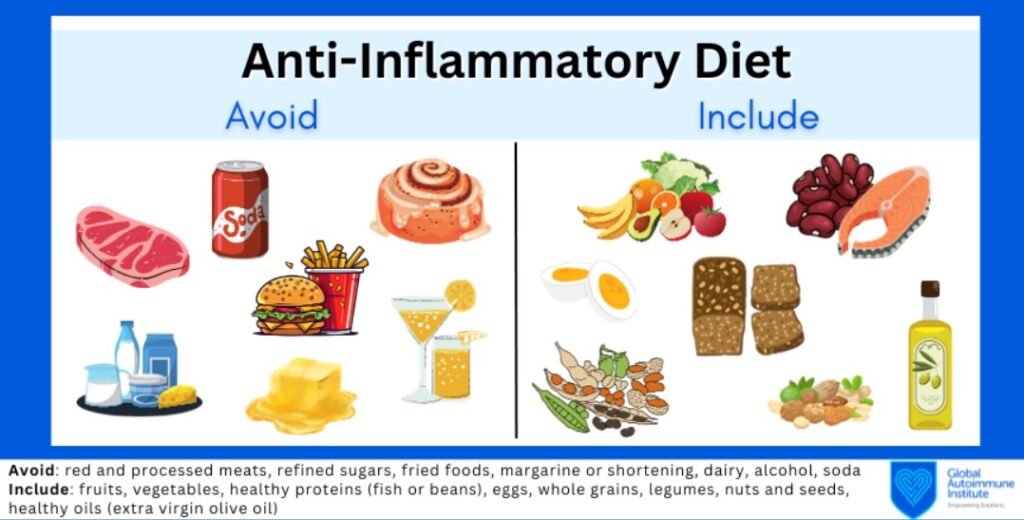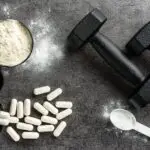
Inflammation is a natural process that helps your body heal and defend itself from harm. However, chronic inflammation can lead to various health issues, including heart disease, diabetes, arthritis, and even certain cancers. Fortunately, diet plays a crucial role in managing inflammation. By incorporating anti-inflammatory foods and supplements into your routine and avoiding those that promote inflammation, you can support your body’s natural defenses and improve your overall well-being.
Understanding Inflammation
Inflammation is the body’s response to injury, infection, or harmful stimuli. Acute inflammation is short-term and necessary for healing, but when inflammation becomes chronic, it can contribute to numerous health problems. Chronic inflammation occurs when the immune system goes into overdrive, attacking healthy tissues and causing long-term damage.
Diet is one of the most effective ways to manage inflammation. By choosing the right foods and supplements, you can help reduce inflammation and support your health.
The Best Anti-Inflammatory Foods
- Fatty Fish
Fatty fish such as salmon, mackerel, sardines, and trout are rich in omega-3 fatty acids, particularly EPA and DHA. These fatty acids have been extensively studied for their anti-inflammatory effects. Omega-3s help reduce the production of inflammatory molecules like cytokines and prostaglandins. Including fatty fish in your diet at least twice a week can provide substantial anti-inflammatory benefits.
- Leafy Greens
Leafy greens like spinach, kale, and Swiss chard are packed with antioxidants, vitamins, and minerals that help combat inflammation. These vegetables are rich in vitamin K, which plays a crucial role in reducing inflammatory markers in the body. Their high fiber content also supports gut health, which is closely linked to inflammation.
- Berries
Berries, including strawberries, blueberries, raspberries, and blackberries, are some of the most potent anti-inflammatory foods. They are loaded with antioxidants, particularly anthocyanins, which give them their vibrant colors and help reduce inflammation. Berries also have a low glycemic index, which helps regulate blood sugar levels, further reducing inflammation.
- Nuts and Seeds
Nuts and seeds such as almonds, walnuts, chia seeds, and flaxseeds are excellent sources of healthy fats, fiber, and antioxidants. Walnuts, in particular, are high in alpha-linolenic acid (ALA), a type of omega-3 fatty acid that helps reduce inflammation. Nuts and seeds also provide magnesium, a mineral that has been shown to reduce inflammation markers.
- Olive Oil
Extra virgin olive oil is a staple of the Mediterranean diet, known for its anti-inflammatory properties. It contains a compound called oleocanthal, which has effects similar to non-steroidal anti-inflammatory drugs (NSAIDs). Olive oil is also rich in monounsaturated fats, which support heart health and reduce inflammation.
- Turmeric
Turmeric is a bright yellow spice commonly used in Indian cuisine. It contains curcumin, a powerful anti-inflammatory compound that has been extensively studied for its health benefits. Curcumin inhibits the activity of inflammatory enzymes and reduces oxidative stress. Pairing turmeric with black pepper enhances its absorption, making it even more effective.
- Garlic
Garlic is not only a flavor powerhouse but also a potent anti-inflammatory food. It contains sulfur compounds, such as allicin, that help reduce inflammation and boost the immune system. Garlic has been shown to lower the risk of chronic diseases linked to inflammation, such as heart disease and cancer.
- Tomatoes
Tomatoes are rich in lycopene, an antioxidant with strong anti-inflammatory properties. Cooking tomatoes increases the availability of lycopene, making tomato-based sauces and soups excellent choices for reducing inflammation. Tomatoes also provide vitamin C and potassium, which support overall health.
- Green Tea
Green tea is one of the healthiest beverages you can consume. It is loaded with antioxidants, particularly catechins, which have strong anti-inflammatory effects. Drinking green tea regularly can help reduce the risk of chronic diseases and support overall health.
The Best Anti-Inflammatory Supplements
- Fish Oil
Fish oil supplements are rich in omega-3 fatty acids, particularly EPA and DHA, which are known for their anti-inflammatory properties. These supplements can be especially beneficial for those who do not consume enough fatty fish. Regular intake of fish oil can help reduce inflammation and lower the risk of chronic diseases.
- Curcumin Supplements
Curcumin, the active compound in turmeric, is available in supplement form and is a powerful anti-inflammatory agent. Taking curcumin supplements can help reduce inflammation throughout the body, particularly in conditions like arthritis. Look for supplements that contain piperine or black pepper extract to enhance absorption.
- Ginger
Ginger is another spice with potent anti-inflammatory properties. Ginger supplements or ginger tea can help reduce inflammation, especially in conditions like osteoarthritis. Gingerol, the active compound in ginger, has been shown to inhibit the production of inflammatory cytokines.
- Resveratrol
Resveratrol is a compound found in red grapes, red wine, and certain berries. It has strong anti-inflammatory and antioxidant properties. Resveratrol supplements can help reduce inflammation, particularly in the cardiovascular system, and support heart health.
- Probiotics
Probiotics are beneficial bacteria that support gut health, which is closely linked to inflammation. A healthy gut microbiome can help reduce inflammation and support overall health. Probiotic supplements can be particularly helpful for those with digestive issues or who have taken antibiotics.
Foods to Avoid
Just as certain foods can reduce inflammation, others can promote it. To manage inflammation effectively, it is important to limit or avoid the following:
- Refined Carbohydrates
Refined carbohydrates, such as white bread, pastries, and sugary cereals, have a high glycemic index and can spike blood sugar levels. This spike can trigger an inflammatory response in the body. Opt for whole grains instead, which have a lower glycemic index and provide more nutrients.
- Processed Meats
Processed meats, such as sausages, hot dogs, and bacon, contain high levels of saturated fats and advanced glycation end products (AGEs), both of which can increase inflammation. Limiting processed meat intake and choosing lean proteins, like chicken or fish, can help reduce inflammation.
- Sugary Beverages
Sugary drinks, including soda and sweetened juices, are high in added sugars, which can promote inflammation. These beverages can also contribute to weight gain and increase the risk of chronic diseases. Water, herbal teas, and unsweetened beverages are better choices for hydration.
- Trans Fats
Trans fats, often found in fried foods, baked goods, and margarine, are among the most inflammatory substances you can consume. They increase levels of harmful LDL cholesterol and reduce beneficial HDL cholesterol, promoting inflammation and heart disease. Avoid trans fats by reading labels and choosing foods with healthy fats instead.
- Excessive Alcohol
While moderate alcohol consumption, particularly red wine, may have some anti-inflammatory benefits, excessive alcohol intake can lead to inflammation and damage to the liver and other organs. Limit alcohol consumption to reduce the risk of chronic inflammation.
Conclusion
Managing inflammation through diet is a powerful way to support your overall health and reduce the risk of chronic diseases. By incorporating anti-inflammatory foods like fatty fish, leafy greens, berries, and healthy fats, and by avoiding inflammatory foods like refined carbohydrates, processed meats, and sugary beverages, you can help your body maintain a balanced inflammatory response.
Supplements like fish oil, curcumin, ginger, and probiotics can further enhance your anti-inflammatory efforts, providing additional support to your diet. Remember that consistency is key, and making small, sustainable changes to your eating habits can have a significant impact on your health over time.







